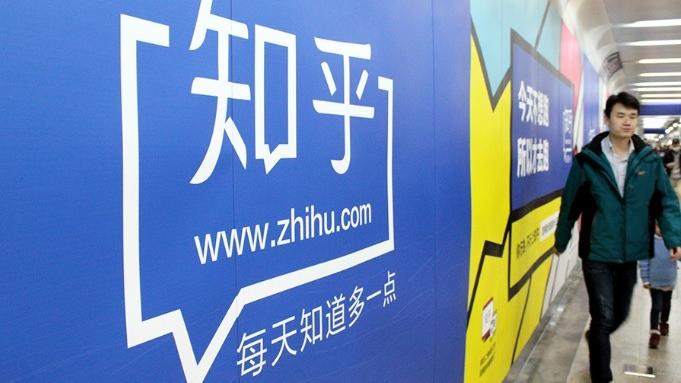 This undated photo shows a billboard of Zhihu.com, a Beijing-based knowledge-sharing website, in Nanjing, Jiangsu province. (WANG QIMING / CHINA DAILY)
This undated photo shows a billboard of Zhihu.com, a Beijing-based knowledge-sharing website, in Nanjing, Jiangsu province. (WANG QIMING / CHINA DAILY)
Chinese question-and-answer website Zhihu Inc makes a primary listing in Hong Kong on Friday, which will make it the first Chinese internet company to have primary listings in both the city and the US.
Shares of the Beijing-based company tumbled by 22.5 percent to HK$24.85 ($3.17) at noon of its first day of trading on the Hong Kong Stock Exchange. Zhihu raised about HK$792 million at an offering price of HK$32.06 per share, selling in lots of 100.
Zhihu’s revenue tripled from 2019 to 2021, reaching at $464.4 million, but the company is still operating in the red, with a 2021 net loss of $203.8 million, according to its regulatory filings for the listing
On Thursday, the US Securities and Exchange Commission added Zhihu to its latest list of companies that face the risk of being removed from US stock exchanges for not giving access to their audited accounts. The New York-traded shares were down 1.2 percent to $1.63 at the exchange’s opening bell on Friday.
Zhihu’s revenue tripled from 2019 to 2021, reaching at $464.4 million, but the company is still operating in the red, with a 2021 net loss of $203.8 million, its regulatory filings for the listing said.
The Tencent-backed company has a weighted voting rights structure, with two of the US-listed depository receipts equaling one Hong Kong share, according to its prospectus. A total 26 million Class-A shares have been sold by early investors.
Zhihu’s dual primary listing represents its listing status in Hong Kong and the US is equal, unlike existing dual listings, such as Alibaba and Baidu, which listed on US stock exchanges as primary venues with the Hong Kong Stock Exchange as the secondary one.
 Electronic boards display various stock prices at Exchange Square in Hong Kong on March 9, 2020. (ISAAC LAWRENCE / AFP)
Electronic boards display various stock prices at Exchange Square in Hong Kong on March 9, 2020. (ISAAC LAWRENCE / AFP)
A source familiar with the matter said the primary listing in Hong Kong means that by meeting certain standards, Zhihu can reach the Chinese-mainland market via the two-way cross-border Stock Connect programs to enhance its trade liquidity.
ALSO READ: IPOs, delisting in China regulator focus to curb risks
Zhihu’s dual primary listing represents its listing status in Hong Kong and the US is equal, unlike existing dual listings, such as Alibaba and Baidu, which listed on US stock exchanges as primary venues with the Hong Kong Stock Exchange as the secondary one
“Zhihu’s homecoming listing diversified participants’ holdings of the Hong Kong stock market,” as the property sector traditionally plays a significant role in HKEX, the source added.
Tom Chan Pak-lam, chairman of the Institute of Securities Dealers, said that Zhihu’s dual primary listing is a shot in the arm for the Hong Kong IPO market, as the city has seen few large IPOs in recent years because of the COVID-19 crisis and the geopolitical risks.
With the regulatory impasse between China and the US over access to the Chinese firms’ audits, financial pundits expect more US-listed Chinese issuers to follow suit, as the alternative-listing venue gives these firms optionality and provides a hedge against the delisting risk.
Chinese listings are at risk of being delisted in the US since the Holding Foreign Companies Accountable Act was passed by the US Congress and signed into law by then-US president Donald Trump in 2020. The law empowers the SEC to delist foreign companies from US exchanges if they fail to comply with US audit requirements for three straight years.
Zhihu went public on the New York Stock Exchange in March 2021 at an offering price of $9.50. The shares have been falling around 70 percent over the year under the US threat of delisting.
READ MORE: NYSE U-turns on delisting China's telecoms
Established in 2020, Zhihu had 99.6 million average monthly active user and 500 million average monthly visitors as of the fourth quarter of last year, its prospectus said. Its net loss climbed nearly 75 percent last year from $80.03 million in 2020.


